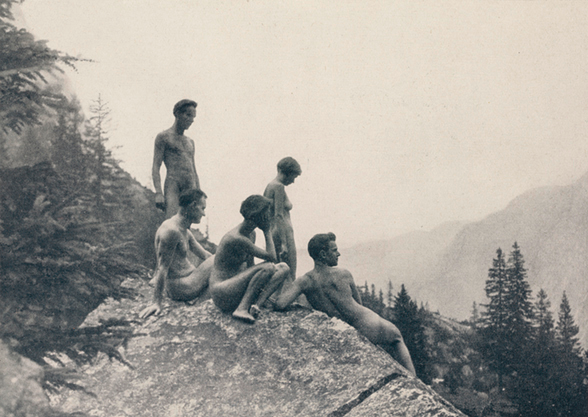Is Switzerland a country of naturists? And is naturism just about being nude? The Swiss National Library investigates the emergence of naturism in Switzerland and what the movement is about beyond the old clichés.
In the collective imagination, naturism is often thought of as an expression of freedom. The lifestyle, which is based on the notion of living in harmony with nature, is generally associated with summery and sunny settings. It calls to mind famous places, such as l’Île du Levant and the beaches of Cap d'Agde, and outdoor activities such as swimming and hiking. And for the more daring among us, it might even bring back the memory of tasting this very special kind of freedom for ourselves.
And the Swiss like getting naked too!
The naturism culture, which emerged in the 19th century particularly in Germany as part of the “Lebensreform” (back to nature) movement, was soon emulated in other countries, including Switzerland. The Swiss movement was spearheaded by Eduard Fankhauser, among others. His meeting with the writer Werner Zimmermann – a proponent of the “Lebensreform” and considered one of the first ecologists of the 20th century – ended up convincing him of the benefits of naturism. Fankhauser's efforts to promote the right to be nude in public in Switzerland soon came up against the limits of the legal framework, as the country is more conservative than its neighbours. This incited him to set up the Swiss Naturism Organisation (ONS) in 1927, headquartered in Thielle, between Lake Bienne and Lake Neuchâtel.
Supporters of naturism argue that it is not only about promoting nudity. It also reflects an authentic way of life that encourages people to adopt a healthy lifestyle, without alcohol, smoking or eating meat. This is why vegetarians have always led the way in this back to nature movement. Naturism also advocates a move away from modern life and materialism where everything revolves around accumulating wealth and stuff, to focus on a simpler and more meaningful life.
Campsite paradises
"Smoke-free, teetotal, meat-free holidays without any tan lines on your naked skin": so read a 1971 leaflet promoting camps throughout Europe where naturists could spend their holidays with like-minded folk, away from mass tourism. According to the Umbrella Organisation of Swiss Naturists, today there are about ten such campsites throughout Switzerland.
From the beginning, naturists were encouraged to expose their skin to the benefits of fresh air and sun, and to keep fit by taking regular exercise. Incidentally, naturism is not a seasonal sporting phenomenon: it is practised on the water (swimming) or dry land (hiking, archery) in the summer, and – for those who don't mind the cold – on skis in the winter. Various works in the National Library's general collection, such as the periodical “die neue zeit” provide evidence of the practice of “nude sport” (see the sources below for some examples).
As for society's beauty ideals, naturism eschews all judgement. In the naturism movement, there is no such thing as the ideal aesthetic: all bodies accentuated by sun and fresh air are considered beautiful and celebrated.
Back to basics
Karl Dudler argues that there is nothing amoral about nudity and that it is not associated with sexuality, as we might expect within the society back then. The Swiss Naturism Organisation (ONS) was very sceptical towards the sexual liberation of the 1960s and 1970s and criticised the growing commercialisation of sexuality, vehemently distancing itself from social movements advocating sexual debauchery and promiscuity. Naturism revolves around the notion of 'purity of body' and therefore 'purity of mind'. From the outset, the ONS therefore always sought to make nudity inseparable from morality. For example, future members had to fill out a questionnaire on their reasons for wanting to join the movement. In general, married couples were preferable to single people, in order to refute the claim that naturism was about seeking sexual partners, explains historian Eva Locher.
Ultimately, naturism makes us question our own lifestyles. Wouldn't it be possible and beneficial to imagine a simpler life, away from moral judgements and social pressure? Perhaps you will think about that this summer. If you happen to be visiting Berlin, will you opt for a swim in your costume or trunks in the Spree or nude bathing in the Teufelssee?
Bibliography and sources
- Stop on a mountain hike, photograph published in: die neue zeit, n° 5 (1929), p. 108.
- Ski outing, photograph, photograph published in: die neue zeit, n°1 (1930), p.11.
- Fankhauser, Eduard. Nacktheit vor Gericht. Thielle: die neue zeit, 1948.
- Fankhauser, Eduard. Ile du Levant: Sylt. FKK in der Schweiz = Le naturisme en Suisse. Thielle: die neue zeit, 1956.
- Dudler, Karl. Was ist freikörperkultur?: Eine volkstümliche Erläuterung = Qu’est-ce que le naturisme. Zielbrücke: die neue zeit, 1963.
- die neue zeit: Illustrierte für neuzeitliche Lebensgestaltung: offizielles Organ des Schweizer Lichtbundes (ONS) = organe officiel de l'Organisation naturiste suisse (ONS). Bern, Thielle: ONS, 1929-1934.
- Locher, Eva. Natürlich, nackt, gesund. Die Lebensreform in der Schweiz nach 1945. Frankfurt a. M.: Campus Verlag, 2021.
- Weibel, Andrea. Naturisme. In: The Historical Dictionary of Switzerland [online]. Version dated 17.12.2009.
- Zürcher, Christoph. Eduard Fankhauser. In: Historical Dictionary of Switzerland [online]. Version dated 07.01.2015.
- Organisation des naturistes en Suisse (ONS) [online, in French or German], consulted on 07.06.2023.
- Umbrella Organisation of Swiss Naturists (UNS) [online], consulted on 07.06.2023.
- Swimcheck: Teufelssee [online], consulted on 07.06.2023.
Last modification 22.06.2023
Contact
Swiss National Library
SwissInfoDesk
User services
Hallwylstrasse 15
3003
Bern
Switzerland
Phone
+41 58 462 89 35






